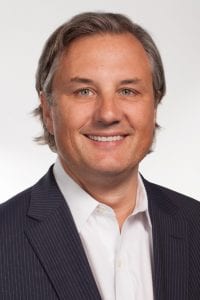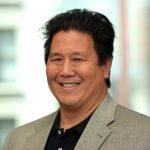
Paul Gunning credits the DePaul MBA program for helping him develop skills to create a strong company culture and cultivate disciplined processes for turning revenue into profit.
In 1992, Paul Gunning (MBA ’99) was driving toward Vail, Colo., when his 1969 Volkswagen bus broke down in the middle of Chicago. Gunning, who had just finished an internship in Washington, D.C., was planning to move to Colorado with friends. That plan never came to fruition, and Gunning ended up calling Chicago home.
The Cleveland native now works in advertising as president and chief operating officer of DDB Advertising U.S., overseeing the agency’s offices throughout the United States. Founded in 1949, the global advertising agency is owned by Omnicom Group Inc. and serves major brands such as MillerCoors, Capital One and State Farm.
Gunning’s advertising career started when he began working as an account executive for Frankel & Co. in 1996. His employer offered to pay his MBA tuition. Since Gunning earned an undergraduate degree in history, he took night classes to earn math credits at Harold Washington College before enrolling at DePaul.
“It took a lot of drive to complete (my MBA) but I remember fondly working in groups with other people who had full-time jobs and learning about their jobs, their industries and their roles,” he says. “I liked meeting folks who were in banking, health care, finance and other industries.”
Gunning had a knack for sales and began working for Tribal Worldwide, an agency that is also owned by Omnicom, after completing his MBA in 1999. Thanks to his advanced degree and ability to win new business, Gunning was named CEO of Tribal and oversaw the agency’s financial, strategic and operational leadership globally.
“I was good at sales,” he recalls. “I landed a lot of accounts and, because I was bringing those in and using the skills from the MBA, (I was able) to run them quite profitably.”
Prior to becoming president and COO, Gunning served five years as president of DDB Chicago. Under his leadership, DDB Chicago brought in new accounts including MillerCoors, Symantec and Scotts Miracle-Gro, among others. Gunning credits the DePaul MBA program for giving him the skills necessary to lead.
Those skills include the ability to cultivate both people and profits, he says. “There’s a lot of competition for a qualified workforce, so you need to have a strong culture but also disciplined processes to make sure you can turn that revenue into profit. A lot of those skills were developed because of the DePaul program.”
By Jaclyn Lansbery
Read about DePaul MBA grads from other decades:
- The 1950s: From GI to MBA
- The 1960s: Scholars of Change
- The 1970s: MBA-Powered Leaders
- The 1980s: Chicago-Educated, World Ready
- The 1990s: Cultivating People and Profits
- The 2000s: Leaders Who Pay It Forward
- The 2010s: The Career-Changing MBA
More memories from a 1990’s DePaul MBA graduate:
 “Probably one of my fondest memories was going to France and Germany (on a study abroad seminar) with Professor (Ashok) Batavia from the Department of Economics. Professor Batavia was well known among the students for his ability to teach, especially the lessons that were being taught in the world, as they were unfolding in the news. He was a renaissance man and had so much charisma; he spoke five languages, he had multiple post-graduate degrees, he was an international traveler, yet he was so humble and generous with his knowledge. And I remember sitting on a Euro rail train on that trip, talking to him about how to optimize the game of black jack and just sitting there thinking, ‘Is there anything this guy cannot do?’ He was challenging me to use this skill that I really hadn’t used in a long time.
“Probably one of my fondest memories was going to France and Germany (on a study abroad seminar) with Professor (Ashok) Batavia from the Department of Economics. Professor Batavia was well known among the students for his ability to teach, especially the lessons that were being taught in the world, as they were unfolding in the news. He was a renaissance man and had so much charisma; he spoke five languages, he had multiple post-graduate degrees, he was an international traveler, yet he was so humble and generous with his knowledge. And I remember sitting on a Euro rail train on that trip, talking to him about how to optimize the game of black jack and just sitting there thinking, ‘Is there anything this guy cannot do?’ He was challenging me to use this skill that I really hadn’t used in a long time.
I just remember thinking, ‘He was living his life on his terms.’ I remember thinking to myself this is the way that I should carve out my path – to grow a set of skills and optimize them to the highest level that I possibly could and then use those tools not just to work in corporate America but to carve my path as to how I wanted to live my life. And that was really a distinct memory while I was studying for my MBA at DePaul.”
— Chris Mah (MBA ’96)
Advanced Manufacturing Engineering Product Manager
Xylem
